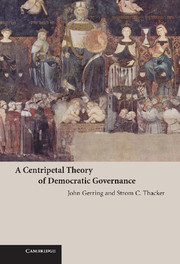Book contents
- Frontmatter
- Contents
- List of Figures
- List of Tables
- Acknowledgments
- A Centripetal Theory of Democratic Governance
- 1 Models of Governance
- PART ONE CAUSAL MECHANISMS
- PART TWO EMPIRICS
- 5 Hypotheses
- 6 Cross-National Tests
- 7 Assessing the Evidence
- PART THREE CONCLUSIONS
- Appendix A Defining Good Governance
- Appendix B Alternative Theories Revisited
- Sources
- Author Index
- Subject Index
5 - Hypotheses
Published online by Cambridge University Press: 06 July 2010
- Frontmatter
- Contents
- List of Figures
- List of Tables
- Acknowledgments
- A Centripetal Theory of Democratic Governance
- 1 Models of Governance
- PART ONE CAUSAL MECHANISMS
- PART TWO EMPIRICS
- 5 Hypotheses
- 6 Cross-National Tests
- 7 Assessing the Evidence
- PART THREE CONCLUSIONS
- Appendix A Defining Good Governance
- Appendix B Alternative Theories Revisited
- Sources
- Author Index
- Subject Index
Summary
The key to good government, we have argued, is to be found in institutions that successfully combine authority and inclusion within a democratic setting. Institutions must reach out to all interests, ideas, and identities (at least insofar as they are relevant to the issue at hand). And they must provide an effective mechanism for reaching agreement and implementing that agreement. This is the process of gathering together that culminates, over time, in good government
What sort of institutions are these, exactly? In chapter one, we suggested a number of possibilities in a preliminary sort of way (see Table 1.1). Among these options, we stipulate that three are so fundamental, and so far-reaching, that they deserve the appellation “constitutional.” They are unitarism, parliamentarism, and closed-list PR. In this chapter, we elaborate a strategy for measuring these factors so that we might test their impact on the quality of governance.
However, our primary theoretical interest concerns not the independent effects of unitarism, parliamentarism, and closed-list PR but rather their combined effects on good governance. Thus, we place greatest emphasis on a variable that aggregates these factors in a single indicator, dubbed Centripetalism. Our central hypothesis is that, on balance, centripetal polities produce better governance than decentralist polities. (We follow the convention of capitalizing these terms only when they are employed as variables, so as to distinguish general concepts from empirical indicators that are specific to this project.)
- Type
- Chapter
- Information
- A Centripetal Theory of Democratic Governance , pp. 87 - 100Publisher: Cambridge University PressPrint publication year: 2008



